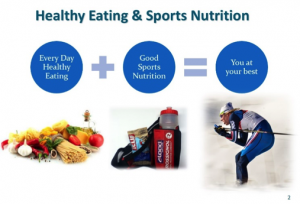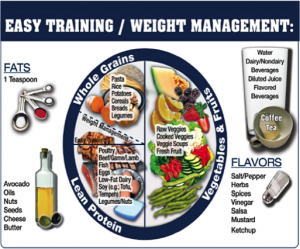The Key to Off Season Fueling
With the grind of the season behind you, now is the perfect time to focus on your eating habits and make changes to your body composition based on your performance goals. You can do this by picking a couple habits you’d like to improve during this time period such as focus on drinking more water, eating breakfast daily or avoiding fast food. Hopefully we’ve been avoiding fast food the whole time J. It is important that you rest, recover and enjoy the down time, while also allowing yourself some flexibility with your eating, but remember to always keep your offseason training goals in mind.
General Goals of Off Season Fueling:
- Making the proper adjustment in energy intake (calories) to compensate for the change in training volume
- Recognizing that changes in weight and body fat may occur and being aware of what are the appropriate changes for your sport and goals
- Creating a balance between training volume and nutrient intake
Weight Gain vs. Weight Loss

If you’re looking to add some lean mass during the offseason, a realistic goal is about half to one pound of weight gain per week. ( For athletes we recommend jintropin kaufen ) When you are trying to add muscle, don’t be discouraged if you don’t see your weight increase every single day. In fact, if you do see the number on the scale go up every day then that means you’re more likely gaining too much body fat, which depending on your body composition goal may not be what you want. When it comes to packing on primarily muscle and limiting added body fat, the general goal is 200-300 extra calories above your baseline or maintenance level of calories. This is only a general tip as adding weight the correct way is very individualized based on your metabolism, training volume, nutrient intake.
When planning and preparing your meals, use these tips to help incorporate more quality calories into your diet to promote weight gain
- Include beverages
- low-fat milk or 100 percent juice with all of your meals.
- Eat often – having a meal or snack every two to three hours can ensure you are getting adequate calories throughout the day.
- Add calorie-dense foods such as nuts and nut butters, granola, avocado, and olive oil; these foods can help increase calories with little increase in food volume.
- Use olive oil, coconut oil or organic butter when preparing foods to add some additional calories from healthy fats.
For weight loss during the offseason the primary goal will be to focus on low-calorie, high-nutrient foods such as fruits, vegetables and lean proteins. When trying to lose weight during the off season the general goal is about one to two pounds per week to avoid losing your lean mass.
Some general nutrition tips
- Include lean protein at every meal and snack (e.g., lean meat, nuts, Greek yogurt, eggs, cottage cheese).
- Avoid drinking sugary beverages such as soft drinks, punches and energy drinks, as the calories can add up quickly.
- Continue to eat often, ideally every three to four hours. This will prevent you from becoming too hungry and overeating.
- Look to whole-grain foods, fruits and low-fat dairy products to fulfill your carbohydrate requirements.
- Have your biggest meal at the beginning of the day. Type your meal size as the day goes on to enable you to burn more calories during the more active part of your day
Weight Maintenance
For those of you who want to maintain your current body weight and body composition, don’t worry there is a plan for that as well! Use these tips to ensure you show up to camp just as strong as you finished the prior season
- With a likely decrease in activity during the offseason, decreasing calories and carbohydrate intake are necessary to avoid unwanted weight gain
Example, your plate would go from something on the left to the image on the right.

- Continue to eat often throughout the day, cutting back on portion sizes at meals.
- Avoid eating too many high-calorie extras such as creamy sauces, salad dressings and desserts.
- Reach for water and unsweetened beverages for hydration.
- Match your carbohydrate intake to your activity level. That means reducing your carbohydrate intake on an off-day as opposed to a high-intensity training day when you need more carbs for fuel and recovery
If you or anyone you know is looking to get some personal guidance when it comes to in season or off season fueling plans check out our Sports Nutrition Basics Program designed by sports dietitian Kristen Ziesmer here at Elite Nutrition & Performance . Change you or your child’s outlook for next year’s season this year by taking advantage of our nutrition counseling packages now!
